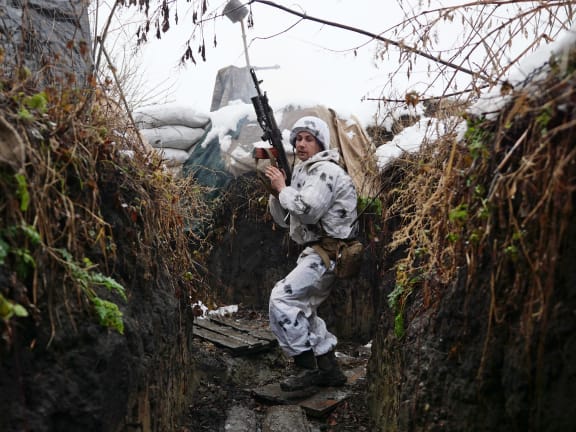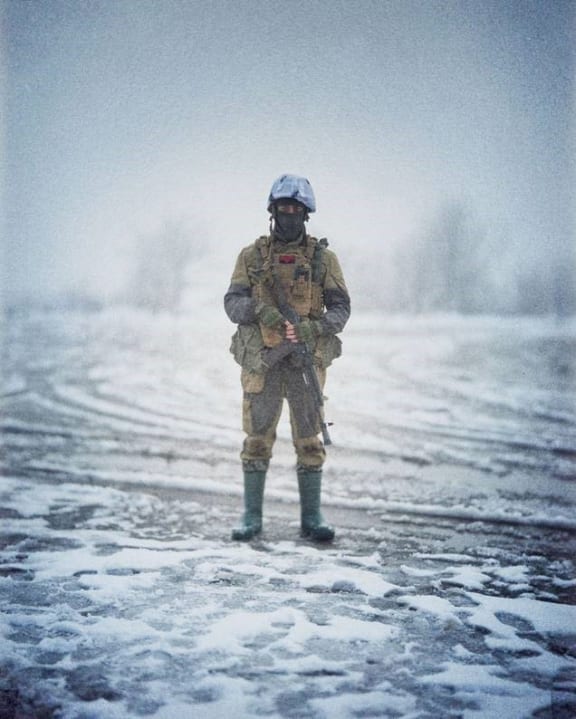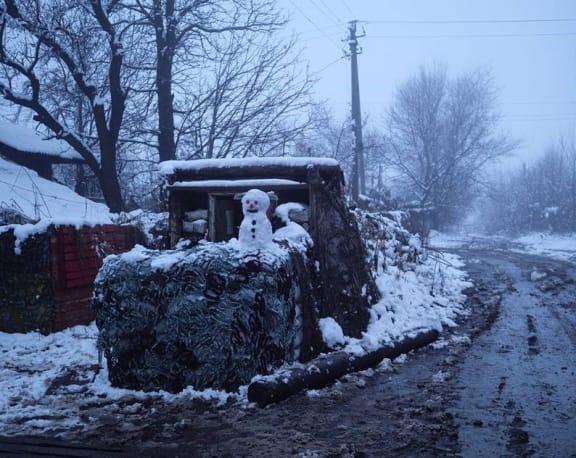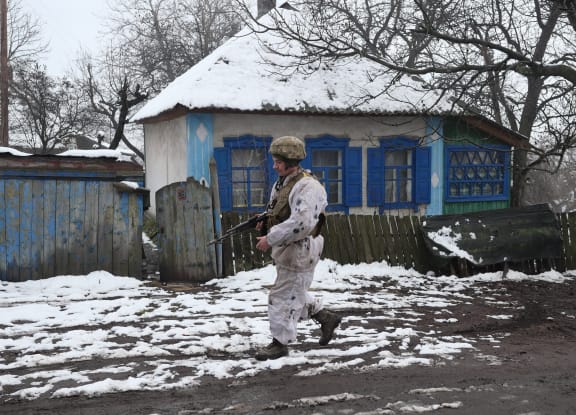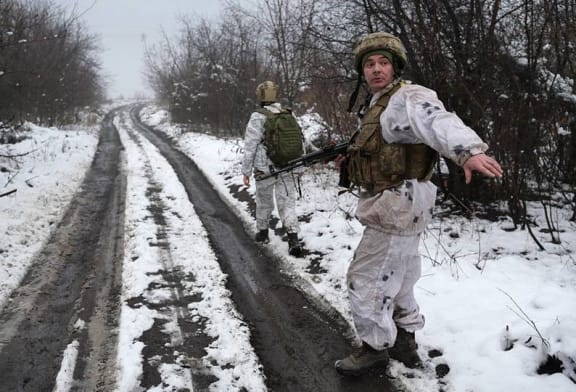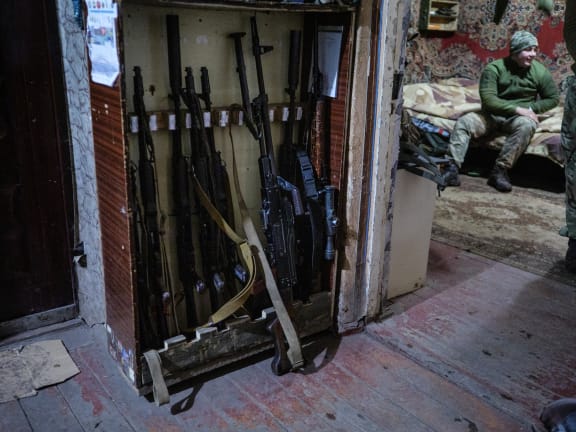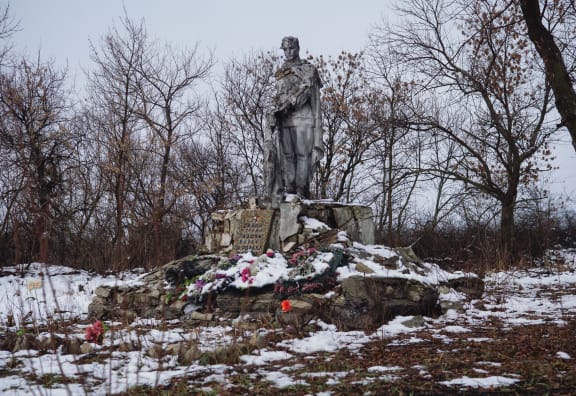New Zealand photojournalist Amos Chapple has just returned from a stint on the frontlines of the conflict in Eastern Ukraine.
Working for Radio Free Europe/Radio Liberty, Chapple travelled to the frontline to find out what the situation is like there amidst talks of an invasion by Russian forces to intervene in the conflict between Ukraine and separatist populations in the east of the country.
Russian president Vladimar Putin has said his country believes what is happening to those pro-Russian communities is genocidal.
It was only seven years ago that Russia seized part of southern Ukraine and backed separatists in the east, but Chapple says the Ukrainian soldiers he spent time with dismissed the threat of attack as little more than "political games."
Nevertheless, a Russian military build-up near Ukraine continues to raise fears Moscow is about to attack its neighbour.
Reflecting on his time on the frontline from his base in Prague, Chapple says there are wider geo-poltical struggles in the region, with the former Soviet power concerned about an increasing presence of NATO and US allies along its border.
The US has also been doing all it can to halt Russia's gas pipeline infrastructure Nord Stream 2 into Germany. This week the US establishment described the pipeline to the EU as a "tool of malign influence of the Russian Federation".
Chapple tells Jim Mora he was lucky as a journalist to enter the country as a time when things were escalating.
“I’d previously applied for frontline access for a different story I was doing relating to the Ukraine’s 30-year anniversary of independence, and unbeknown to me at the time it takes at least four weeks to get that accreditation.
“So, I then found myself in the spot where everybody wanted to get to the frontlines to speak to soldiers to see what the situation was like with all this heat and talk around potential invasions. Three months after applied for the accreditation I then had it… so I was just able to get there before anybody else could."
He said he was curious to know what was being said on the ground as the talk of potential war continued to come out of Washington.
The young Ukrainian soldiers he spoke to didn’t share Washington’s public appraisal of those imminent dangers. They saw Putin engaging in brinkmanship in geopolitical manoeuvres against US and NATO dominance in the region.
“I had some pretty unguarded moments with some of the soldiers… I felt like I understood what they think and these are really well-informed young men and women who’s entire lives at the moment are dedicated to war and studying the war.
"Some of the things they said were really insightful, including one young guy who said ‘no look, this is nonsense’. He’d studied the satellite images, which left everybody so worked up that showed armour massing at the border. He said there’s no field hospitals and there’s no petrol tankers in place, so that indicates it’s just show.”
All Putin wants is a guarantee that Ukraine will not join NATO, they said.
“Russia does not want any more countries joining NATO, for obvious reasons. They will not know where a potential invasion comes from along this longer and longer border with NATO countries," Chapple says.
“But the flip side of that is countries should be free to determine which military alliance it joins.
He said a friend who worked for the US government had told him there was a budget in place to move all US citizens out of Kiev, suggesting there was a genuine risk of things escalating in the region.
Being on the front line there was a fascinating but frightening experience, and important for a journalist to understand a conflict that may go on for a while, he says. It became particularly clear soldiers were alert to heightened risks during certain changing conditions on the ground.
“When you arrive at the frontline in the dark you have no idea where you are… we had a 25-minute walk through the darkness and I’m following these two soldiers, talking quietly, and I thought as the mist was coming down this was a good thing for us.
“Later on, I learned that the misty weather is what gets the soldiers very stressed because that’s when ‘diversion teams’ arrive – the guys that come in and sneak around close to the Ukrainian lines – and that might end in the nightmare of all nightmares, like a knife battle in the trenches for example, in silence.”
One major element of the experience that was most alarming was what he called a lack of agency – not being in control of where he was going or who he was going with.
When following agitated Ukrainian soldiers running across frontline positions, Chapalle was at his most tense.
“Bear in mind, in Ukraine like as in many former Soviet countries, people do not care at all about safety. Taxi drivers will physically stop you putting on your seatbelt," he says.
“So, when Ukrainian soldiers are turning and saying ‘get back behind me and looking concerned because I’d stepped to the left and was possibly visible to a sniper from the other side, it’s like, okay, this is dangerous.”
He said several times within the hour a boom would be heard echoing in the distance. Fighting was a daily occurrence.
Fighting also involved the use of drones, used to drop explosive devices on opposing forces in the region.
“There’s incredibly intense things happening out there, but because it’s been dragging on long enough we don’t think about it or talk about it anymore,” he says.
This week US Senate Democrats unveiled a bill to impose sweeping sanctions on top Russian government and military officials, including Putin, and key banking institutions if Moscow engages in hostilities against Ukraine.
The proposed legislation, backed by the White House, includes provisions to help bolster Ukraine's security.
It also encourages the US to "consider all available and appropriate measures" to ensure the Nord Stream 2 gas pipeline does not become operational..
Putin had already warned any more sanctions imposed by the US over Ukraine could lead to a total breakdown of relations.
‘The political cost for Putin to invade Ukraine would be enormous,” Chapple says.
Putin, who has repeatedly rejected claims Russia is about to invade the country.
Chapple says he attempted to take a look at a high-profile drone being used to attack separatists’ positions, thought to be of Turkish origin, but that he was denied access to the launching sites.
He says his experience of the war reinforced the view that conflicts like these would be determined by “blood and iron” and not within UN or EU talks.
